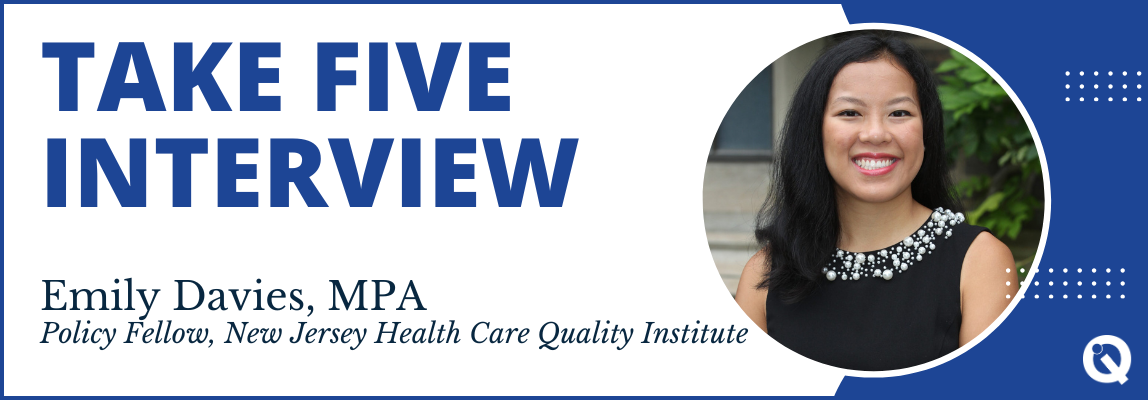Emily Davies, MPA, Policy Fellow at the Quality Institute.
Can you tell us about yourself and what drew you to the Quality Institute?
The Quality Institute’s approach to policy change through multi-sector engagement resonates with my own personal values of collaboration — of thinking about how we can break down barriers to work together to improve health care.
I most recently served as the COVID-19 Collateral Impact Surveillance Coordinator at the NYC Department of Health and Mental Hygiene, creating an integrated data system to monitor the pandemic’s impact on New Yorkers’ health and wellbeing. I also have worked in early education and child welfare research, including national evaluations of home visitation and pediatric primary care programs. I’m excited to bring this experience to support the Quality Institute.
What will be your initial areas of focus at the Quality Institute?
My focus will be on the project, “A Clearer Path to Care: Mapping New Jersey’s Children’s Mental Health System.” It’s a statewide initiative to better understand and then improve the mental health system for children in our state. The Quality Institute, with funding and partnership from the New Jersey Department of Children and Families (DCF), is leading the project.
The goal is to provide a comprehensive overview of how children and youth access mental health care in New Jersey. What services are available? What are eligibility requirements and payment limitations? We want to highlight where the system functions well — and identify gaps, duplication, and disconnects. The goal is to use data to create a visual journey — and then make recommendations to strengthen the system.
How does your background lend itself to the work you are doing on the Children’s Mental Health Mapping project?
My background is mostly in research and data, and I see this project as an exciting opportunity to dive into more qualitative data. It’s using data to create a story and understand what is happening in this very complex statewide system. Right now, my work as a fellow at the Quality Institute is in the data collection stage, including researching national best practices and interviewing stakeholders. I see this as a great opportunity to use my research skills to create impact on something as important as how children get mental health care.
How do you see data collection impacting your work in mental health?
As a data person, I think of data as part of a larger storytelling initiative. When I think about collecting data — whether I’m looking at administrative statistics from nearby hospitals or listening to a family with lived experience in the mental health care system — I am thinking about how we can connect these different data points to better understand the fuller picture. This project is really talking across fields — from schools to courts to health care systems. Thinking about how we can bring that all together is what I think of as data interpretation. We’re telling a story.
Finally, beyond your professional life, can you share an experience that shaped who you are today?
As an adoptee myself, I come to this field reflecting on how much holistic support families need, not only to stay together, that’s certainly true, but also to really offer children the opportunities to thrive. My career here at the Quality Institute and more broadly has been thinking about how we can create policies that offer that meaningful, tangible support for families. And in the context of the mapping project, how we can truly offer this wraparound care and support. And that means not just thinking about the children, but also thinking about the parents, thinking about the siblings, how we can empower families with resources and community. And so that’s a little bit of my personal interest in the topic.

